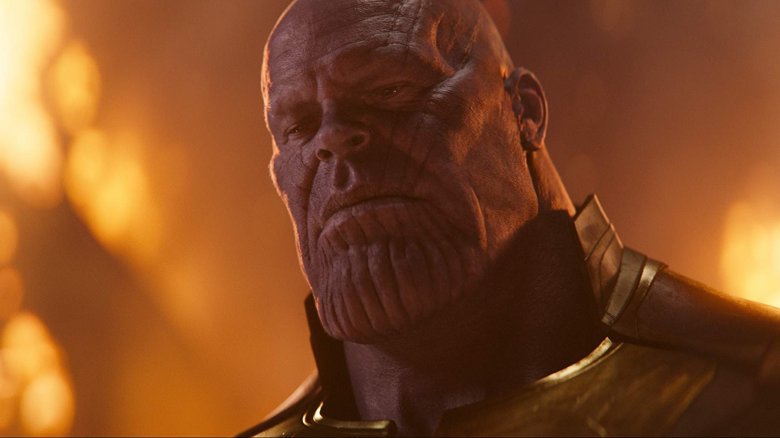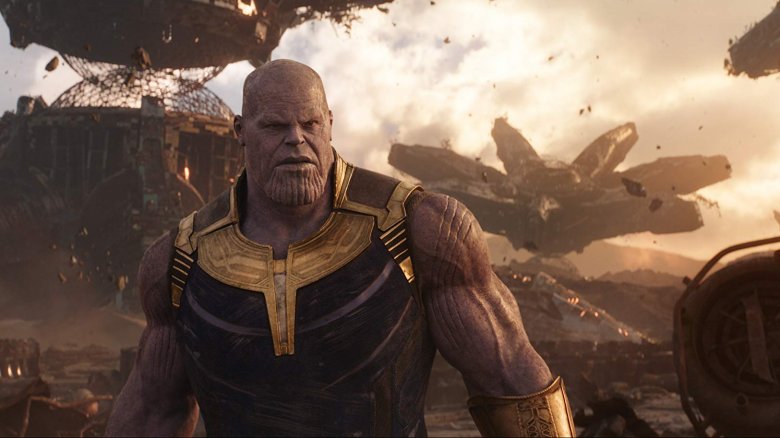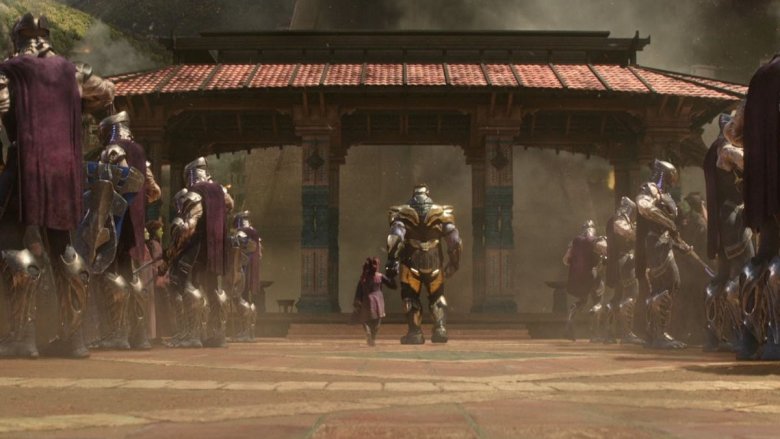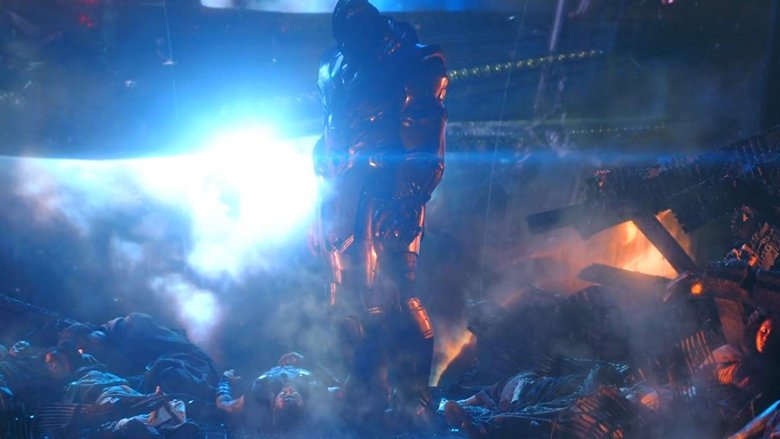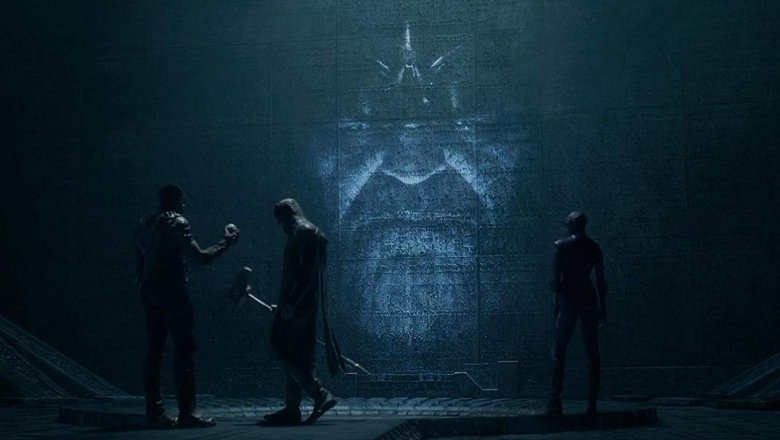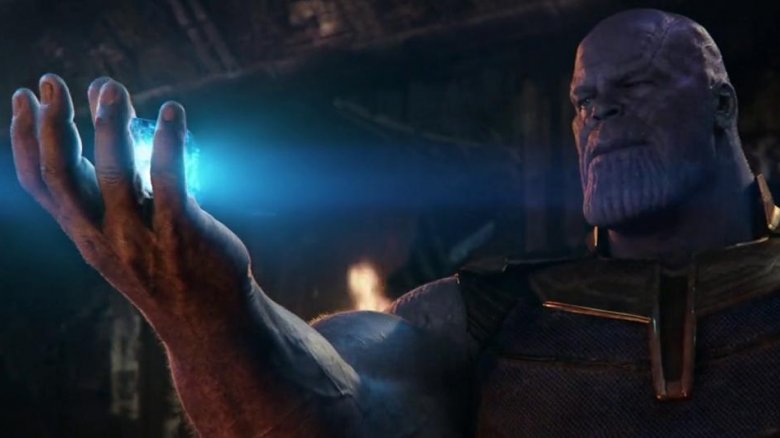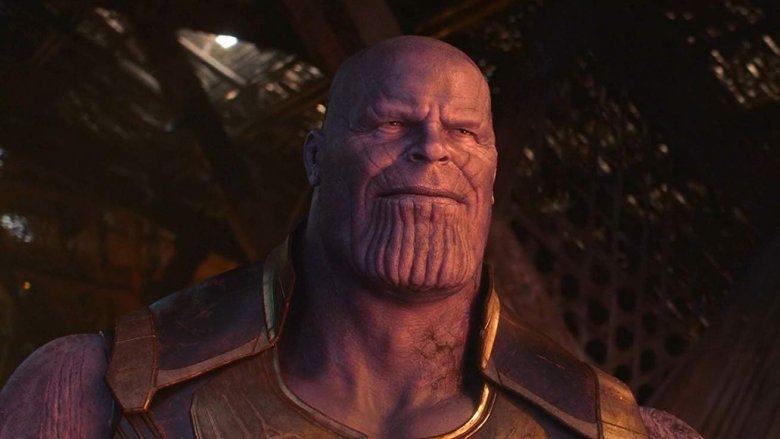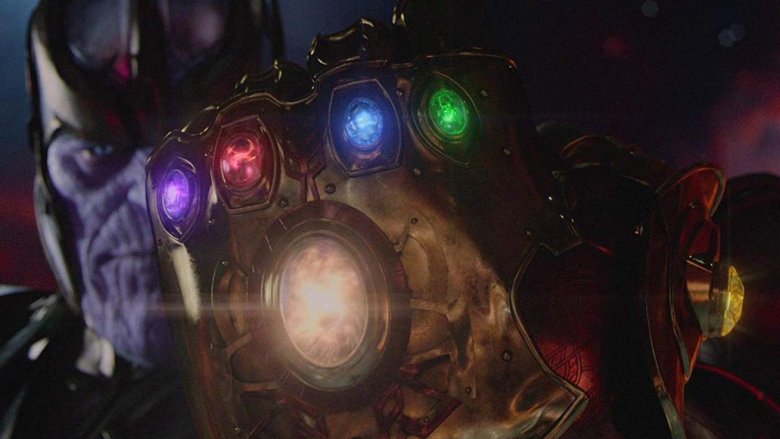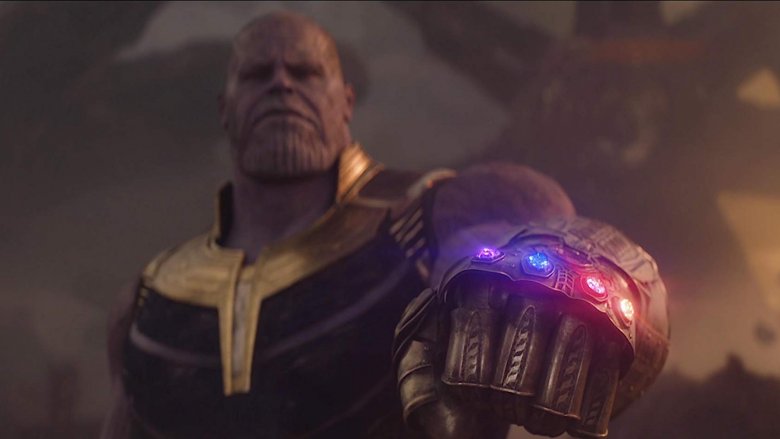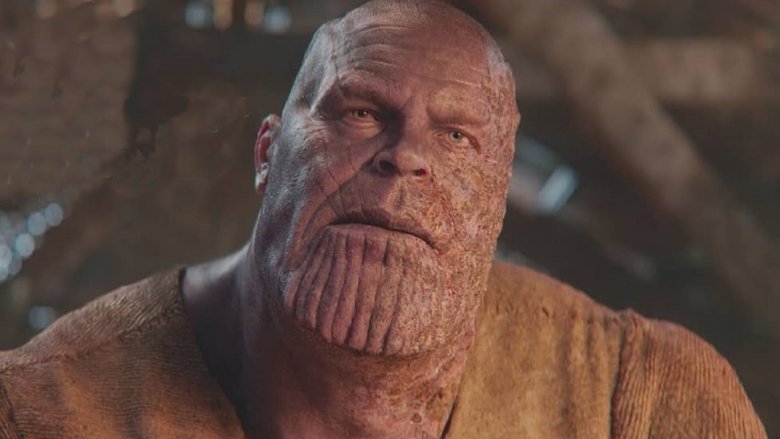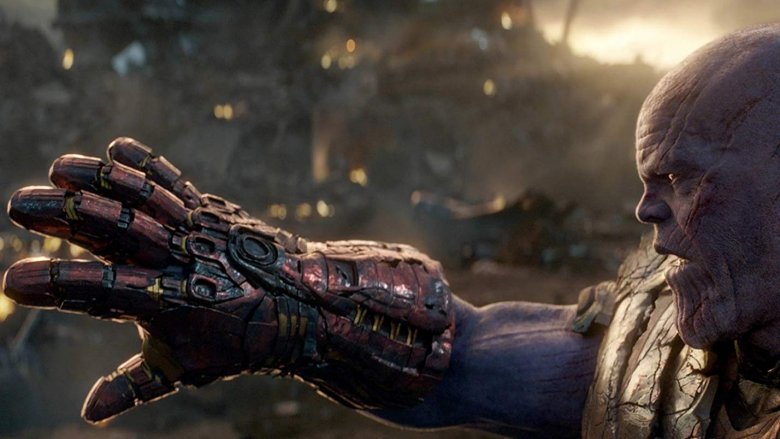Thanos' Motivation And 'The Snap' Explained
No movie villain has been discussed, memed, and celebrated as much in recent years as Thanos, the Mad Titan at the heart of the Marvel Cinematic Universe's record-breaking Infinity Saga. When he made his first big-screen appearance in the coda scene of The Avengers in 2012, Thanos was a name only comic book fans knew, a villain that struck fear in the hearts of Avengers readers but meant nothing to the uninitiated. That all changed in 2018 with the arrival of Avengers: Infinity War, in which Thanos — a peripheral puppet master villain in the MCU up until then — proved himself the biggest, baddest threat Earth's Mightiest Heroes had ever faced, and quickly became a global obsession.
Even now, months after Avengers: Endgame arrived in theaters and rose to become the biggest movie of all time, we're still talking about the many complexities within Thanos as a character, from his life for his adoptive "children" to his quest for "balance" to why exactly he chose to use the Infinity Stones how and when he did. With all that in mind, let's take a deep dive into the motives of Thanos, and how his universe-altering "Snap" came together.
The fall of Titan
The journey that ultimately became the Infinity Saga in the MCU began on the planet Titan, when Thanos was a young man. Thanos described his homeworld as a paradise when he lived there, but he watched it face a growing problem as he aged: Depleting resources and overpopulation. As the leaders of Titan sought solutions, Thanos came forward with a radical idea: Randomly kill half of the population regardless of wealth or status so that the other half might prosper.
For this suggestion, Thanos was exiled from his home planet, but on Titan his prediction actually came true. He watched as his world collapsed and deteriorated until its civilization went extinct and the planet itself was rendered uninhabitable. His idea was radical, but to Thanos' unstable mind, the fall of Titan made it obvious that he was right, even if no one else agreed with him. What started as the notion of a madman grew in his mind, becoming an all-consuming cause that would become his life's work.
Thanos the Warlord
The destruction of his people on Titan convinced Thanos that the rest of the universe was primed to suffer the same fate, and that he was the only one with the conviction to stop the oncoming suffering. He truly believed that, if he could rid the universe of half its population in an ultimately "fair" and "dispassionate" way, he could save the surviving half from suffering starvation and poverty.
To achieve this, Thanos initially took a more conventional approach to his plan of semi-extermination, and recruited alien armies like the Chitauri to his cause. He became a conqueror, going planet to planet and slaughtering half of every population he came across. As he worked, he found those who actually agreed with his cause and became his disciples, who he adopted as his "Children." Among them were Corvus Glaive, Proxima Midnight, Cull Obsidian, and Ebony Maw, who was a particularly gifted speaker able to put Thanos' mission and message into words in such a way that the Titan himself encouraged and adopted the self-aggrandizing mythology. He was no longer just a conqueror, but a liberator, not a killer but a savior.
While conducting his mission on the planet Zen-Whoberi, he met a brave and curious little girl named Gamora, and took a liking to her. While his soldiers slaughtered her people, Thanos bonded with Gamora, and adopted her as his daughter.
Infinity Quest
In the years that followed Thanos cultivated ruthlessness in Gamora and her adoptive sister, Nebula, "gifting" each of them with cybernetic enhancements to make up for his perceived shortcomings in each of them. Over time this stoked competition for his affection, and Gamora rose to become the favorite among all of his children.
It was also during these intervening years that Thanos learned of a faster, more efficient way to achieve his goal of balance in the universe: The Infinity Stones, six "singularities" left over from the creation of the universe. The Stones were immensely powerful, so much so that even groups of beings were unable to have sustained contact with them, and through the millennia they'd been scattered throughout the galaxy.
Thanos began to see himself as the only being worthy of wielding the Stones, and using their reality-altering power to achieve his ends with the mere snap of his fingers. He was equipped with legions of soldiers and a small but deadly band of loyal commanders, but to get the Stones he needed more intimate means, and began seeking allies in his cause.
Failed alliances
Though he'd begun to view himself as equal parts pragmatic problem solver and cosmic messiah, to the rest of the galaxy Thanos was often viewed as a radical warlord who led through violence and a ruthlessness. When he began to turn his efforts toward hunting the Infinity Stones rather than simply continuing his mission via conquest, he took an approach that was something of a hybrid, merging his warlord reputation with his goal of cosmic balance.
That meant Thanos needed allies in the hunt for the Stones, though they didn't necessarily need to know what he was really after. After first managing to acquire the Mind Stone in the form of a scepter, Thanos hatched a plan to very quietly snag two Stones at once. To do this he drafted the Asgardian Loki, who himself had designs on conquering Earth, and loaned himself the scepter and a Chitauri army in return for bringing him the Tesseract, which housed the Space Stone. He also later dispatched the Kree zealot Ronan the Accuser to acquire the Power Stone in a mysterious Orb, and quietly dispatched Gamora to hunt for the most secret of the Stones, the Soul Stone.
All these plans ultimately failed. Loki was thwarted by the Avengers and Ronan was killed by the Guardians of the Galaxy. Meanwhile, Gamora sensed the evil in Thanos' endgame, and burned the map to the Soul Stone upon finding it.
I'll do it myself
Two major events happened over the course of just a few years which convinced Thanos the time had come to stop relying on alliances and his children to get the Stones for him and simply begin the hunt personally. The first arrived when the artificial intelligence known as Ultron destroyed the scepter and freed the Mind Stone, which set the Asgardian Thor on Thanos' trail as he began to investigate the Stones. The second came when the Asgardian King Odin went into exile and Loki assumed rule of Asgard, leaving the other Nine Realms vulnerable. Thanos used this weakness to invade Nidavellir, the realm of the dwarves, and force the dwarf Eitri to fashion a gauntlet for him strong enough to carry all six stones. With a housing for the Stones in hand, Thanos and his armies began their attack.
He struck first at Xandar, where the Nova Corps (weakened by the events of Guardians of the Galaxy) kept the Power Stone, and won an easy victory. He confronted Thor and Loki to take the Space Stone, then quickly pushed through in his efforts to gain the other Stones, but at great cost. On Vormir, after extracting its location from Gamora, Thanos learned that to get the Soul Stone he had to sacrifice what he loved. After mentioning that he had failed before and could not fail now, Thanos murdered Gamora for the Stone, proving that he really would go to any length to achieve his goal.
Victory at last
Thanos secured the sixth and final Infinity Stone on Earth after a battle in Wakanda, ripping the Mind Stone out of the head of the android Vision. Though Thor nearly killed him at that moment, Thanos was still able to snap his fingers and finally achieve his goal. Half of all living creatures were wiped out throughout the universe in a matter of moments.
The sheer amount of power emitted by using all six stones at once severely burned Thanos' arm and melted the gauntlet on his hand. It also briefly sent his consciousness into the Soul Stone, where he saw Gamora as she was when he first met her, a curious girl willing to confront him about anything. It was here, in this place between worlds, where Thanos was asked once again to confront how far he was willing to go, as the young Gamora asked him what it had cost to achieve his dream. His answer: "Everything." Still, as he retreated to his chosen place of retirement to watch the sun rise on "a grateful universe," he smiled to himself. It had never been personal for Thanos, but in that moment he felt a deep sense of personal fulfillment, regardless of the cost of his efforts.
Perfectly balanced
When Thanos met Gamora, he presented her with a jeweled blade and commented that it was "perfectly balanced, as all things should be." If there's a single facet of his ideology that Thanos seemed to champion above all others, it was the idea of balance as the driving force at the heart of universal peace and prosperity, an idea reinforced by the fall of Titan and by his assurance to Gamora later in her life that her home planet was "a paradise" now that resources were abundant.
With this in mind, many fans have raised the question of why Thanos wouldn't simply use the Infinity Stones to create more resources, or transmute some raw materials into new resources so the universe could prosper without anyone dying. According to Infinity War co-writer Stephen McFeely, the resources were never the point. The point was to give civilizations a second chance to get things right and learn a lesson.
"No, it's about free will," McFeely said. "[Doubling resources] doesn't solve the problem. We're just going to get there millions of years from now. This is an opportunity for people to get it right. He trusts them, you know?"
The mechanics of the Snap
Separately, each of the Infinity Stones is the distilled essence of a particular element of existence, and as such they each have unique individual abilities. The Reality Stone can change the way people perceive things, the Time Stone can alter the flow of time, the Space Stone can transport people across great distances, and so on. Together they are the combined forces that make up existence — and, as the Ancient One put it, "the flow of time" — as we see them in our day to day lives. With just one you can change one aspect of existence. With all six, you can change everything about existence, provided you have the will to dream it into being.
That explains why Thanos needed all six Stones to impose his will upon the entire universe at once, but how does Thanos' snap actually work when it's put into practice? Well, the Space Stone would obviously come in handy at reaching great distances, and the Soul Stone might help to wipe various forms of consciousness away, but the actual physical act of reducing bodies to dust was the work of the Power Stone.
"The Power Stone was blipping them out of existence," Infinity War VFX supervisor Dan DeLeeuw said.
Destroying the Stones
His goals achieved, Thanos retired to a beautiful and isolated planet to live out a quiet life, but he quickly realized he had one more task to complete. He'd spent years of his life journeying through the cosmos to acquire the Stones, and using them all at once had significantly weakened him. It would still be possible for someone else to come along, overpower him, and take the Stones away to undo what he'd done. With this in mind, Thanos summoned all his remaining strength and "used the Stones to destroy the Stones." He nearly died in the process, but the Stones were "reduced to atoms" under his command. Days later, the Avengers arrived to do exactly what he'd feared, and when he told them they couldn't take the Stones because the Stones no longer existed, Thor beheaded him for it. Thanos died believing that he'd achieved a final victory due to the humility of his realization that even he shouldn't wield the Stones again, but the story wasn't over.
The inevitable ego of Thanos
Desperate to undo the suffering Thanos caused, the Avengers developed a method of time travel to go back and retrieve the Stones so they could form their own gauntlet and bring the lost half of life in the universe back. Their plan was working until Thanos, after witnessing unusual phenomena in past Nebula's cybernetic brain, accessed her shared memories with her future self and realized what the plan was. Five years before he would actually get the Stones, Thanos became aware of what his future self did, and became determined to preserve it.
In the process, Thanos' quest for "dispassionate" balance in the universe took the form of a personal vendetta against the Avengers. After capturing future Nebula and using her time travel tech to move into the future, Thanos discovered the Avengers had already undone his actions, and declared that he would slaughter all of Earth as punishment. It was no longer about balance, but about victory, and Thanos' rage-fueled assault on the planet served as proof that there was an ego at the heart of his mad crusade all along. His last words, before realizing that Tony Stark had won the Stones and was about to wipe him out, were "I am inevitable," exposing him for what he always was: A tyrant whose chief dream was to prove himself right.
